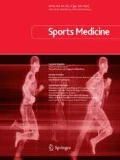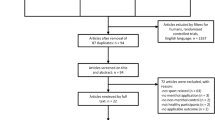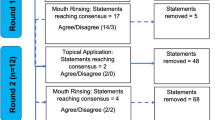Abstract
The application of menthol has recently been researched as a performance-enhancing aid for various aspects of athletic performance including endurance, speed, strength and joint range of motion. A range of application methods has been used including a mouth rinse, ingestion of a beverage containing menthol or external application to the skin or clothing via a gel or spray. The majority of research has focussed on the use of menthol to impart a cooling sensation on athletes performing endurance exercise in the heat. In this situation, menthol appears to have the greatest beneficial effect on performance when applied internally. In contrast, the majority of investigations into the external application of menthol demonstrated no performance benefit. While studies are limited in number, menthol has not yet proven to be beneficial for speed or strength, and only effective at increasing joint range of motion following exercise that induced delayed-onset muscle soreness. Internal application of menthol may provoke such performance-enhancing effects via mechanisms related to its thermal, ventilatory, analgesic and arousing properties. Future research should focus on well-trained subjects and investigate the addition of menthol to nutritional sports products.
Similar content being viewed by others
References
Noakes TD. Time to move beyond a brainless exercise physiology: the evidence for complex regulation of human exercise performance. Appl Physiol Nutr Metab. 2011;36(1):23–35.
St Clair Gibson A, Noakes TD. Evidence for complex system integration and dynamic neural regulation of skeletal muscle recruitment during exercise in humans. Br J Sports Med. 2004;38(6):797–806.
Craig AD. Interoception: the sense of the physiological condition of the body. Curr Opin Neurobiol. 2003;13(4):500–5.
Marino FE, Gard M, Drinkwater EJ. The limits to exercise performance and the future of fatigue research. Br J Sports Med. 2011;45(1):65–7.
Karageorghis CI, Priest DL. Music in the exercise domain: a review and synthesis (Part I). Int Rev Sport Exerc Psychol. 2012;5(1):44–66.
Lamarche L, Gammage KL, Gabriel DA. The effects of experimenter gender on state social physique anxiety and strength in a testing environment. J Strength Cond Res. 2011;25(2):533–8.
Jones HS, Williams EL, Bridge CA, et al. Physiological and psychological effects of deception on pacing strategy and performance: a review. Sports Med. 2013;43(12):1243–57.
Burke LM, Maughan RJ. The Governor has a sweet tooth: mouth sensing of nutrients to enhance sports performance. Eur J Sport Sci. 2015;15(1):29–40.
Simon SA, de Araujo IE, Gutierrez R, et al. The neural mechanisms of gustation: a distributed processing code. Nat Rev Neurosci. 2006;7(11):890–901.
Chambers ES, Bridge MW, Jones DA. Carbohydrate sensing in the human mouth: effects on exercise performance and brain activity. J Physiol. 2009;587(Pt 8):1779–94.
Mundel T, Jones DA. The effects of swilling an l(-)-menthol solution during exercise in the heat. Eur J Appl Physiol. 2010;109(1):59–65.
Eccles R. Role of cold receptors and menthol in thirst, the drive to breathe and arousal. Appetite. 2000;34(1):29–35.
Naito K, Komori M, Kondo Y, et al. The effect of l-menthol stimulation of the major palatine nerve on subjective and objective nasal patency. Auris Nasus Larynx. 1997;24(2):159–62.
Patel T, Ishiuji Y, Yosipovitch G. Menthol: a refreshing look at this ancient compound. J Am Acad Dermatol. 2007;57(5):873–8.
Eccles R. Menthol and related cooling compounds. J Pharm Pharmacol. 1994;46(8):618–30.
Schlader ZJ, Simmons SE, Stannard SR, et al. The independent roles of temperature and thermal perception in the control of human thermoregulatory behavior. Physiol Behav. 2011;103(2):217–24.
Stevens CJ, Taylor L, Dascombe BJ. Cooling during exercise: an overlooked strategy for enhancing endurance performance in the heat. Sports Med. 2016. doi:10.1007/s40279-016-0625-7.
Johar P, Grover V, Topp R, et al. A comparison of topical menthol to ice on pain, evoked tetanic and voluntary force during delayed onset muscle soreness. Int J Sports Phys Ther. 2012;7(3):314–22.
Stevens CJ, Thoseby B, Sculley DV, et al. Running performance and thermal sensation in the heat are improved with menthol mouth rinse but not ice slurry ingestion. Scand J Med Sci Sports. 2016;26(10):1209–16.
Riera F, Trong TT, Sinnapah S, et al. Physical and perceptual cooling with beverages to increase cycle performance in a tropical climate. PLoS One. 2014;9(8):e103718.
Tran Trong T, Riera F, Rinaldi K, et al. Ingestion of a cold temperature/menthol beverage increases outdoor exercise performance in a hot, humid environment. PLoS One. 2015;10(4):e0123815.
Barwood MJ, Corbett J, Thomas K, et al. Relieving thermal discomfore: effects of sprayed l-menthol on perception, performance, and time trial cycling in the heat. Scand J Med Sci Sports. 2015;25(Suppl. 1):211–8.
Kounalakis SN, Botonis PG, Koskolou MD, et al. The effect of menthol application to the skin on sweating rate response during exercise in swimmers and controls. Eur J Appl Physiol. 2010;109(2):183–9.
Watson HR, Hems R, Roswell DG, et al. New compunds with menthol cooling effects. J Soc Cosmet Chem. 1978;29:185–200.
Stevens CJ, Bennett KJ, Sculley D, et al. A comparison of mixed-method cooling interventions on pre-loaded running performance in the heat. J Strength Cond Res. 2016. doi:10.1519/JSC.0000000000001532.
Riera F, Tran Trong T, Rinaldi K, et al. Precooling does not enhance the effect on performance of midcooling with ice-slush/menthol. Int J Sports Med. 2016;37(1–7). doi:10.1055/s-0042-107597
Maunder E, Laursen PB, Kilding AE. Effect of ad libitum ice slurry and cold fluid ingestion on cycling time-trial performance in the heat. Int J Sports Physiol Perform. 2016:1–19. doi:10.1123/ijspp.2015-0764.
Sönmez G, Çolak M, Sönmez S, et al. Effects of oral supplementation of mint extract on muscle pain and blood lactate. Biomed Hum Kinetics. 2010;2:66–9.
Meamarbashi A. Instant effects of peppermint essential oil on the physiological parameters and exercise performance. Avicenna J Phytomed. 2014;4(1):72–8.
Meamarbashi A, Rajabi A. The effects of peppermint on exercise performance. J Int Soc Sports Nutr. 2013;10(1):15.
Barwood MJ, Corbett J, White D, et al. Early change in thermal perception is not a driver of anticipatory exercise pacing in the heat. Br J Sports Med. 2012;46(13):936–42.
Barwood MJ, Corbett J, White DK. Spraying with 0.20% l-menthol does not enhance 5 k running performance in the heat in untrained runners. J Sports Med Phys Fit. 2014;54(5):595–604.
Topp R, Winchester L, Mink AM, et al. Comparison of the effects of ice and 3.5% menthol gel on blood flow and muscle strength of the lower arm. J Sport Rehabil. 2011;20(3):355–66.
Akehi K, Long BC. Application of menthol counterirritant: effect on hamstring flexibility, sensation of pressure, and skin surface temperature. Athletic Train Sports Health Care. 2013;5(5):234–40.
Haynes SC, Perrin DH. Effect of a counterirritant on pain and restricted range of motion associated with delayed onset muscle soreness. J Sport Rehabil. 1992;1(1):13–8.
Gillis DJ, Barwood MJ, Newton PS, et al. The influence of a menthol and ethanol soaked garment on human temperature regulation and perception during exercise and rest in warm, humid conditions. J Therm Biol. 2016;58:99–105.
Smith AP, Boden C. Effects of chewing menthol gum on the alertness of healthy volunteers and those with an upper respiratory tract illness. Stress Health. 2013;29(2):138–42.
Filingeri D. Neurophysiology of skin thermal sensations. Compr Physiol. 2016;6(3):1429.
Gillis DJ, House JR, Tipton MJ. The influence of menthol on thermoregulation and perception during exercise in warm, humid conditions. Eur J Appl Physiol. 2010;110(3):609–18.
Valente A, Carrillo AE, Tzatzarakis MN, et al. The absorption and metabolism of a single l-menthol oral versus skin administration: effects on thermogenesis and metabolic rate. Food Chem Toxicol. 2015;86:262–73.
Gillis DJ, Weston N, House JR, et al. Influence of repeated daily menthol exposure on human temperature regulation and perception. Physiol Behav. 2015;139:511–8.
Nishino T, Tagaito Y, Sakurai Y. Nasal inhalation of l-menthol reduces respiratory discomfort associated with loaded breathing. Am J Respir Crit Care Med. 1997;156(1):309–13.
Fisher JT. TRPM8 and dyspnea: from the frigid and fascinating past to the cool future? Curr Opin Pharmacol. 2011;11(3):218–23.
Blackie SP, Fairbarn MS, McElvaney NG, et al. Normal values and ranges for ventilation and breathing pattern at maximal exercise. Chest. 1991;100(1):136–42.
Kenia P, Houghton T, Beardsmore C. Does inhaling menthol affect nasal patency or cough? Pediatr Pulmonol. 2008;43(6):532–7.
Pereira EJ, Sim L, Driver H, et al. The effect of inhaled menthol on upper airway resistance in humans: a randomized controlled crossover study. Can Respir J. 2013;20(1):e1–4.
Macpherson LJ, Hwang SW, Miyamoto T, et al. More than cool: promiscuous relationships of menthol and other sensory compounds. Mol Cell Neurosci. 2006;32(4):335–43.
Topp R, Brosky JA, Jr., Pieschel D. The effect of either topical menthol or a placebo on functioning and knee pain among patients with knee OA. J Geriatr Phys Ther. 2013;36(2):92–9.
Warm JS, Dember WN, Parasuraman R. Effects of olfactory stimulation on performance and stress. J Soc Cosmet Chem. 1991;42(3):199–210.
Zhang Y, Balilionis G, Casaru C, et al. Effects of caffeine and menthol on cognition and mood during simulated firefighting in the heat. Appl Ergon. 2014;45(3):510–4.
Stevens C, Dascombe B. The reliability and validity of protocols for the assessment of endurance sports performance: an updated review. Meas Phys Educ Exerc Sci. 2015;19(4):177–85.
Author information
Authors and Affiliations
Corresponding author
Ethics declarations
Funding
No sources of funding were used to assist in the preparation of this article.
Conflict of interest
Christopher Stevens and Russ Best declare that they have no conflicts of interest relevant to the content of this review.
Rights and permissions
About this article
Cite this article
Stevens, C.J., Best, R. Menthol: A Fresh Ergogenic Aid for Athletic Performance. Sports Med 47, 1035–1042 (2017). https://doi.org/10.1007/s40279-016-0652-4
Published:
Issue Date:
DOI: https://doi.org/10.1007/s40279-016-0652-4




